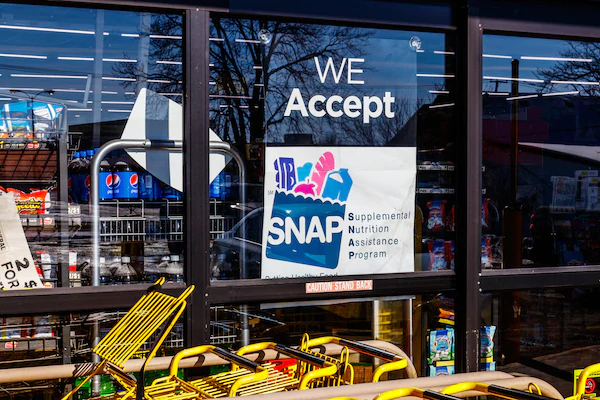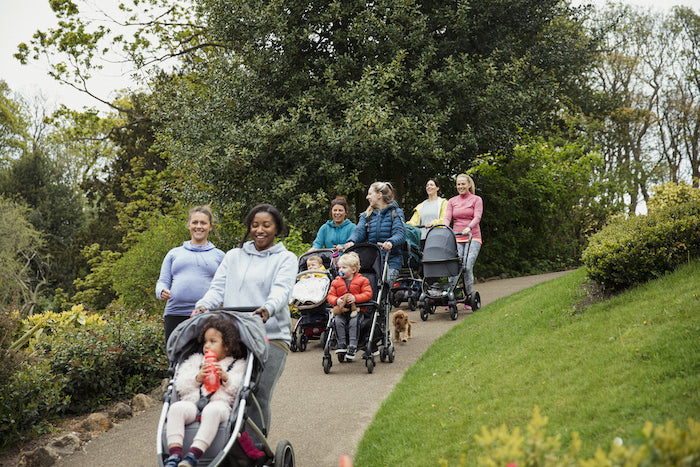BUILDING HEALTHY MILITARY COMMUNITIES TOOLKIT
A RESOURCE FOR THE DEPARTMENT OF DEFENSE HEALTH PROVIDERS AND COMMUNITIES
Resources to Help Service Members and Their Families Maintain a Healthy Weight
Supplemental Nutrition Assistance Program & SNAP-Ed
Supplemental Nutrition Assistance Program (SNAP) provides nutrition benefits to supplement the food budget of families. To get SNAP benefits, Service members must apply in the state in which they currently live and meet certain requirements, including resource and income limits. Many working families use this program to help supplement their food budget. All U.S. citizens have access to this program if they fall at or below set income levels, but eligibility requirements differ by state.
 It is important to note that SNAP has very few limitations on what can be purchased with the supplemental funding. As a result, families can purchase unhealthy foods. SNAP-Ed is a companion program to SNAP that teaches people using or eligible for SNAP about good nutrition, how to make their food dollars stretch further, and how to be physically active. SNAP-Ed works by building partnerships with all types of community organizations. SNAP-Ed works in communities to launch or support social marketing campaigns, hold nutrition education classes, and improve their policies, systems, and environment. SNAP-Ed even addresses local issues like lead poisoning.
It is important to note that SNAP has very few limitations on what can be purchased with the supplemental funding. As a result, families can purchase unhealthy foods. SNAP-Ed is a companion program to SNAP that teaches people using or eligible for SNAP about good nutrition, how to make their food dollars stretch further, and how to be physically active. SNAP-Ed works by building partnerships with all types of community organizations. SNAP-Ed works in communities to launch or support social marketing campaigns, hold nutrition education classes, and improve their policies, systems, and environment. SNAP-Ed even addresses local issues like lead poisoning.
What you can do with these resources:
- Let Service members know how this program can benefit their family and help them apply by directing them to the SNAP State Directory where they can select their state and learn more. If you want to make it easier for Service members, you can locate your state’s contacts on this page and only publish/share your state’s information.
- Find and collaborate with the SNAP-Ed administrators in your state. These are not the same contacts listed in the SNAP State Directory above. Ideas for collaboration include:
- Strategize on methods to increase uptake of program among Service members.
- Market/promote the program directly to Service members and their families featuring their large library of nutrition education materials.
- Do an assessment to learn how many Service members are receiving benefits.
- Host nutrition education classes taught by SNAP-Ed administrators.
- Learn more about and use their social marketing materials.
- Partner with them to work with others in the community to improve their policies, systems, and the environment of the community – visit their library to view examples of policy, systems, and environmental interventions to improve nutrition and physical activity.
ChooseMyPlate
ChooseMyPlate is a comprehensive online resource based on the current Dietary Guidelines for Americans. Service members can use this site to create a personalized food plan based on their age, sex, height, weight, and physical activity level. The site also covers the basics of food safety and food waste prevention which can help Service members maximize their grocery dollars.
What you can do with this resource:
- Share this information with Service members and their families and encourage them to:
- Take a quick self-assessment using the MyPlate Quiz which will provided tailored resources-based answers to a series of simple questions about current eating habits.
- Download and use the Start Simple with MyPlate app, where they can set realistic goals, join challenges, and celebrate successes.
- Explore the food groups and portion size photos in the Food Group Gallery to teach and boost understanding of portions and simple steps for making every bite count.
- Find recipes, watch how-to videos, and create personalized cookbooks at MyPlate Kitchen.
- Learn how to save time, prepare healthy meals and find guidance on how to eat healthy on a budget.
- Use MyPlate’s print materials to educate the Service members and families you serve. They have a collection of resources that offer healthy eating guidance while supporting food preferences budget, and life stage.
Special Supplemental Nutrition Program for Women, Infants, and Children (WIC)
The Special Supplemental Nutrition Program for Women, Infants, and Children – better known as the WIC Program – serves to safeguard the health of low-income pregnant, postpartum, and breastfeeding women; infants; and children up to age 5 who are at nutritional risk by providing nutritious foods to supplement diets, information on healthy eating including breastfeeding promotion and support, and referrals to health and other social services. All U.S. citizens have access to this program if they fall at or below set income levels.
What you can do with this resource:
- Work with small grocery stores or corner stores close to military bases or neighborhoods with high concentrations of military families so they may become authorized to serve WIC clients.
- Let Service members know how this program can benefit their family and help them apply by directing them to WIC’s How to Apply Page.
- Partner with your state’s WIC program to:
- Provide targeted outreach to military families.
- Ask about current or former military service in their new client intake interviews or forms.
- Share data with you (or begin to collect it) about the number of military families they serve.
Active People, Healthy Nation℠ & Move You Way
 Active People, Healthy Nation℠ is a national initiative to help 27 million Americans become more physically active by 2027. This website offers factsheets, presentations, social media posts and badges, and print and digital advertisements that can help encourage military families to increase their level of physical activity.
Active People, Healthy Nation℠ is a national initiative to help 27 million Americans become more physically active by 2027. This website offers factsheets, presentations, social media posts and badges, and print and digital advertisements that can help encourage military families to increase their level of physical activity.
CDC’s Move Your Way website offers easy-to-understand resources for adults, older adults, parents, and kids to help people learn to live healthier lives through increased physical activity.
What you can do with this resource:
- Help the family members of Service personnel understand the basics of physical activity and how much is needed for each age group. Note: Service members might be held to different standards based on their height-weight requirements.
- Encourage them to:
- Join the Active People Healthy Nation Movement
- Share their physical activity successes on social media using #ActivePeople and take advantage of CDC’s sample social media posts.
- Connect with other members of Active People by using #ActivePeople on Facebook, Twitter, and Instagram.
- Download an Active People Badge or an #ActivePeople frame to your Facebook Profile.
- Share the educational materials offered on the Move Your Way website with Service members’ families to learn how they can become more physically active.
- Use the resources on the Active People, Healthy Nation℠ website in newsletters and daily social media posts.
Cooperative Extension Classes
The Cooperative Extension System (Extension) is part of the Unites States’ Department of Agriculture land grant universities. Extension provides low to no-cost education and learning activities to people throughout the country with the goal of improving the lives of individuals and families through nutrition education, food safety training, and youth leadership development. Many Extensions offer other classes ranging from parenting, money management, and disaster preparedness.
Each state has an Extension program with multiple sites. In many states, there are sites in each county or parish which tailor class offerings to local needs. The number and distribution of programs available make Extension and ideal partner for reaching geographically distributed Service members and families.
What you can do with this resource:
- Find and connect with your state’s Extension Service. Extension hosts a variety of programs in addition to education for individuals and families. Once you are on your Extension’s website, look for Family and Consumer Sciences, Family Resources, Family Community Health, or other type of category that mentions family or community.
- Partner with local Extension Programs to offer a nutrition, physical activity, food budgeting, or other type of class at a location close to or on a military installation.
- Promote Extension’s free or low-cost educational programs to the military-connected.
- Partner with Extension to bring local foods, gardening, and food-based education directly to the military schools.
- Partner with a local library and your Extension to offer a Cooking Matters Class.
- Share the meal planning, shopping, and budgeting resources and videos created by Extensions across the county.
